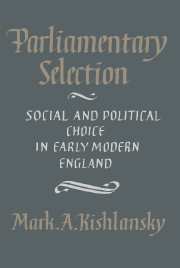6 - Counties and Boroughs
from PART II - ELECTIONS AND POLITICAL CHOICE
Published online by Cambridge University Press: 22 September 2009
Summary
“We can talk of nothing but the elections,” one of George Treby's correspondents wrote in the winter of 1679. One enduring consequence of the English Revolution was the importance of Parliament and its members ever after. Whatever view successive generations adopted toward the “Good Old Cause” or the “Late Usurpation,” they shared a perception of the preeminence of the House of Commons. Lessons and legacy were plain. In the space of twenty years Parliament had removed the crown from one monarch and restored it to another; it had become the key to prosperity or penury by confiscating and redistributing wealth; it had become the source of authority in the nation by assuming the responsibilities of government. In the space of twenty years Parliament had revealed a power – and a potential for power – unimagined by seer or sage. Thereafter, the English governing classes, marrying prudence with ambition, pursued seats in Parliament headlong. “Our measures now at court are so taken that it is essential to a man's succeeding there to be of the Parliament.”
Interest led to study; and study, mastery. Assiduous candidates and patrons reformed the haphazard parliamentary selection process. Anticipation, planning, and intelligence became the prerequisites of a campaign. The prolonged sitting of the Cavalier Parliament channeled pent up demand into unpredictable by-elections. Aspirants had to be ever-vigilant to seize their chances. If opportunity had knocked, it was probably already too late. “Mr. Allestry is yet living, but is on the point of expiring every hour,” the predatory Anchitell Grey wrote in 1665 as he hovered about Derby.
- Type
- Chapter
- Information
- Parliamentary SelectionSocial and Political Choice in Early Modern England, pp. 136 - 162Publisher: Cambridge University PressPrint publication year: 1986



